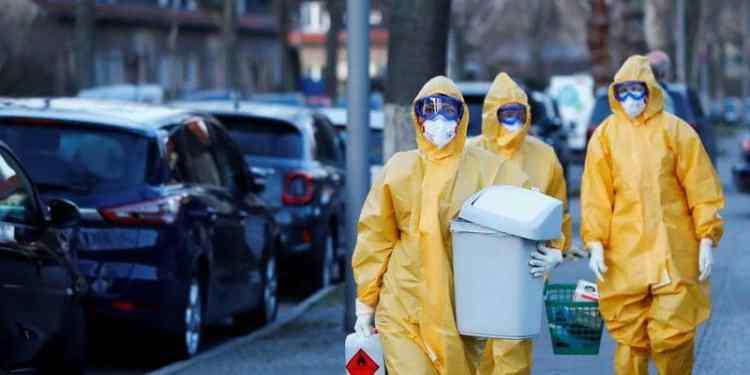Italy on Thursday banned the entry of people arriving from 13 countries, including Bahrain, Oman, and Kuwait, due to concerns over the novel coronavirus.
It has closed its borders to 13 countries that presented an excessive rate of coronavirus infections. The ban list, compiled by the health ministry, includes Armenia, Bahrain, Bangladesh, Brazil, Bosnia and Herzegovina, Chile, Kuwait, North Macedonia, Moldova, Oman, Panama, Peru, and the Dominican Republic.
"The ban affects anyone who has stayed in or traveled through these countries in the last 14 days," Health Minister Roberto Speranza said in a statement.
Travelers from all other countries outside the European Union and the Schengen free movement area can arrive in Italy, however, they must observe a 14-day in quarantine upon arrival.
Italy, which reported its first case on January 31, has been the first European country to be heavily affected by the outbreak. It has recorded over 35,000 deaths, however, the daily tally of fatalities and new infections have dwindled to a fraction of those seen at the peak of its epidemic in late March.
The first two cases of COVID-19 were confirmed in Rome on January 31. A Chinese couple, originally from Wuhan, who arrived in Italy on January 23 via Milan Malpensa Airport, traveling from the airport to Verona, then to Parma, arriving in Rome on January 28.

The novel coronavirus was first reported in Wuhan, China, and has infected about 12,081,516 million people and killed over 550,000, worldwide, a tally based on official data showed. It also hit several celebrities and top political figures around the world.
The United States topped the list of the worst affected countries, with over 132,000 deaths, followed by Brazil with over 67,964, the United Kingdom with 44,517, and Italy with 34,914.
Europe listed over 2,782,032 cases and 201,124 deaths, making it the worst affected continent.
[caption id="attachment_130856" align="aligncenter" width="750"] File photo[/caption]
File photo[/caption]
The virus is a new member of the Coronaviruses group, which was never identified in humans. The viruses’ family also includes Middle East Respiratory Syndrome (MERS-CoV) and Severe Acute Respiratory Syndrome (SARS-CoV), which cause illness ranging from the common cold to more severe diseases.
Coronaviruses are zoonotic, meaning they are transmitted between animals and people. Humans and animals such as mammals and birds can be affected by the disease.
The name coronavirus is derived from the Latin corona, meaning “crown” or “halo”.
On February 11, the World Health Organization (WHO) announced the official name for the disease caused by the new coronavirus is Covid-19, taken from the words “corona”, “virus” and “disease”.
In December 2019, an outbreak was reported in Wuhan, China. On 31 December 2019, the outbreak was traced to a novel strain of coronavirus, which was given the interim name 2019-nCoV by the World Health Organization (WHO), it was later renamed SARS-CoV-2 by the International Committee on Taxonomy of Viruses.
On March 11, the World Health Organization (WHO) declared coronavirus a global pandemic as the new virus has rapidly spread to more than 800,000 people from Asia to the Middle East, Europe, and the United States.

Transmission of viruses between humans happens when someone comes into contact with an infected person’s secretions, such as droplets in a cough.
Coronavirus can also be transmitted by coming into contact with something an infected person has touched and then touching your mouth, nose, or eyes.
It is known that older people appear to be more vulnerable to the effects of the emerging virus.
The virus caused complete paralysis in all activities and events with large gatherings worldwide due to concerns over the spread of the virus.
People across the globe partake in self-isolation for 14 days as an effective precautionary measure to protect those around them and themselves from contracting COVID-19.












